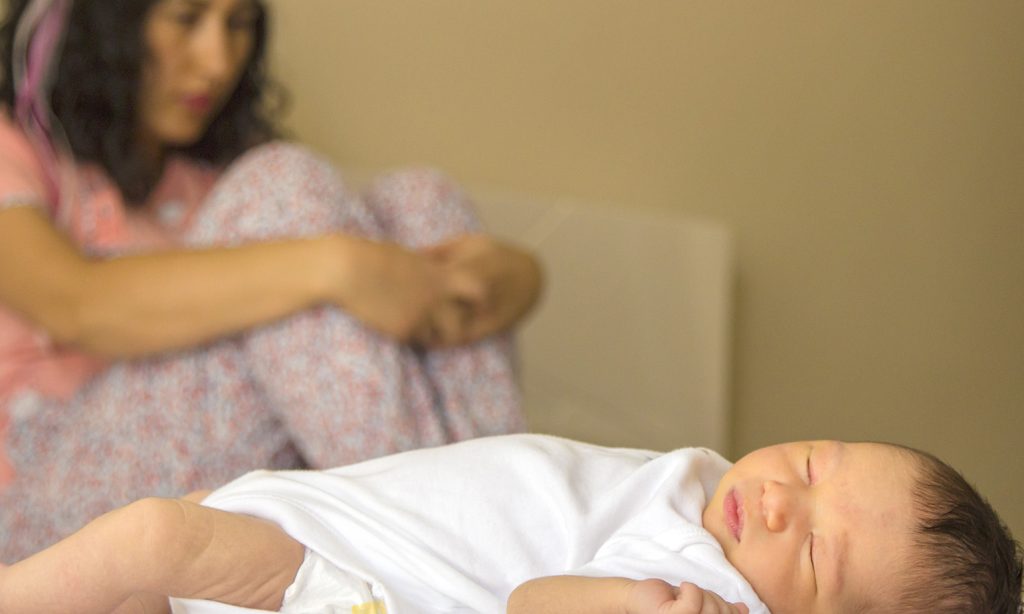Last Updated on April 12, 2023
You’re bound to feel different strong emotions after childbirth. Delight. Excitement. Fear. Anxiety. And many more. Unfortunately, all these feelings can lead to postpartum depression.
After giving birth, most new mothers endure postpartum “baby blues.” These frequently include mood swings, crying outbursts, anxiety, and sleeplessness. The first two to three days after delivery are when baby blues usually start, and they can linger for up to two weeks.
However, postpartum depression, which affects certain new mothers, is a more severe and persistent kind of depression. It is also referred to as peripartum depression, and it can start during pregnancy and last beyond childbirth. Postpartum psychosis is another rare yet severe mood condition that can occur after childbirth.

What Is Postpartum Depression?
Postpartum depression (PPD) is a kind of depression that develops after giving birth. However, it’s not just the person giving birth who can experience postpartum depression. This means adoptive parents and surrogates may also be affected. After having a kid, a person goes through hormonal, physical, emotional, economic, and social changes. And postpartum depression symptoms may be brought on by these changes.
Having a child no doubt transforms your life. And truly, parenting is fun. But it can also be exhausting and overwhelming. This means it is common to feel anxious or unsure, especially if you’re a first-time parent. However, you might develop postpartum depression if your emotions include excessive sadness or loneliness, wild mood swings, and a lot of crying.
One of the most important things to know for aspiring mothers or women already on the journey of becoming mothers is that postpartum depression is not a failing trait or a weakness. Therefore, if you suffer from postpartum depression, getting treatment right away can help you manage your symptoms and strengthen your relationship with your child. Fathers or other family members should also take this seriously as it could save your wife, mother, sister, cousin, or any other family member.
In addition, postpartum depression does not imply that a mother does not love her child. It is a mental health issue that can be resolved with treatment. Therefore, anyone experiencing symptoms ought to visit a doctor right away.

Types of Postpartum Depression
Yes, there are types of postpartum depression, and we have mentioned one of them earlier (baby blues). However, for a clearer understanding, we are going to list out the existing types of postpartum depression. With this, you get to know the stages and differences and know how far you should go in seeking help. The types of postpartum depression:
Baby Blues A.K.A Postpartum Blues
Around 50% to 75% of new mothers experience the baby blues. The baby blues include sadness, anxiety, and repeated, extended crying episodes for no apparent reason. This condition usually manifests within the first week (one to four days) following delivery. Although it can be a painful experience, many women have said it typically goes away without therapy in two weeks. Getting support and assistance from friends, family, or your partner is the finest thing you can get during this period.
Postpartum Depression
About 1 in 7 new parents experience postpartum depression, a much more dangerous disorder than the baby blues. If you’ve previously experienced postpartum depression, your risk rises to 30% with each pregnancy. Along with mood swings, incessant crying, impatience, and exhaustion, you could also feel guilty, anxious, and incapable of taking care of yourself or your child. Mild to severe symptoms may show up a week after delivery or gradually, even up to a year later. Although symptoms can continue for several months, psychotherapy or antidepressants are very effective forms of treatment.
Postpartum Psychosis
Postpartum psychosis is a serious variation of postpartum depression that needs immediate medical attention. And according to research, only 1 in 1,000 people after delivery gets affected by this very uncommon illness. Typically, the symptoms start soon after delivery. And they are severe and linger for a few weeks to many months. Significant anxiety, bewilderment, feelings of helplessness and shame, sleeplessness, paranoia, delusions or hallucinations, hyperactivity, quick speech, or mania are symptoms to look out for if you are suspicious.
And also, since there is a higher chance of suicide and a greater danger of injury to the infant, postpartum psychosis requires rapid medical intervention. Once you complain, you should expect hospitalization, counseling, or being placed on medication, as these are the frequently used treatment methods.

Symptoms of Baby Blues (Postpartum Blues)
- Mood swings
- Anxiety
- Sadness
- Irritability
- Being overwhelmed
- Crying
- Drop in concentration
- Appetite disorders
- Hypersomnia/Insomnia
Symptoms of Postpartum Depression
Although postpartum depression symptoms can differ from woman to woman. But typical symptoms include:
- Feeling depressed, helpless, or overwhelmed
- Feeling anxious or terrified
- Placing unnecessary blame on oneself
- Crying a lot
- Feeling grumpy and angry
- Sleeping excessively or insufficiently
- Eating excessively or insufficiently
- Having difficulties focusing and not wanting to be with friends and family
- Lack of attachment to the child
- Lack of desire for normally fun activities, among others.
Unfortunately, some women keep their symptoms a secret from others because they think they should be cheerful. Truly, new mothers who are unhappy could feel ashamed, guilty, or humiliated about it. They can also worry about being judged as poor mothers. But realistically, any woman can experience depression throughout pregnancy or right after childbirth. It doesn’t imply that they are a bad mother or even worse. If you let yourself accept that no pain is necessary for you or your infant, you will be eager to get help. Try and talk to a doctor. Your doctor can help you figure out if depression is to blame for your symptoms or if anything else is to blame.

Symptoms of Postpartum Psychosis
As earlier stated, Postpartum Psychosis is rare. Hence, the symptoms can be severe and even life-threatening. Symptoms of Postpartum Psychosis therefore include:
- Being bewildered and lost
- Obsessive thoughts about your child
- Delusions and hallucinations
- Having difficulty sleeping
- Being very active and unhappy
- Feeling uneasy
- Attempting to hurt yourself or your child
These symptoms could be life-threatening and, as a result, requires immediate attention. Mothers suffering from postpartum psychosis can take their own lives or that of their infant. They could possibly take both lives. Therefore, immediate attention should not be delayed.
People With High Risks of Going Through Postpartum Depression
Any woman can have postpartum depression, although some may be more susceptible to it than others. Postpartum depression is more common among women who have previously had depression of any kind, including postpartum depression, or who have a family history of the condition.
Also, serious stress during pregnancy, health issues before or after delivery, and a lack of support at home are additional factors that may raise the risk of postpartum depression.

Some Causes of Postpartum Depression
Postpartum depression is a condition that can afflict anyone, yet doctors are unsure of its exact cause. However, environmental variables and genetic factors might be involved. Hence, below are some of the factors that can lead to postpartum depression:
- Past trauma
- hormone variations
- previous diagnosis or a family history of bipolar illness or depression
- Obstacles to sleeping, feelings of being overburdened and unattractive
- the physical and mental strain of childbirth and childcare
- additional stress at work or at home
- the wish to be the ideal parent yet feeling unable to fulfill this goal.
- having no spare time
- experiencing issues breastfeeding
- having a substance use disorder
- having a child with disabilities
- having an unintended pregnancy
- not having family or friends support
- having issues with delivery
- Having a premature baby
- having a newborn with inadequate weight, and so on.
Postpartum Diagnosis
Based on her symptoms, a doctor or psychologist will typically diagnose a woman with postpartum depression. Sometimes the symptoms are picked up by the woman herself. Other times, the symptoms are discovered by a worried spouse, partner, relative, or acquaintance.
How Can I Get Treated?
In order to ensure the health of both the mother and her child, postpartum depression must be treated. A patient’s chance of recovery increases with the speed of treatment. You should definitely not waste time getting treated because, most of the time, treatments are successful. The doctor typically recommends a combination of counseling and medicine or one of both once they have determined the problem. Check below for a list of likely treatments to be recommended:
- Counseling
- strengthening self-care (getting enough sleep, eating well, exercising, and taking time to relax)
- seeking additional support by signing up for a group or speaking (physical or virtual) with people with similar experience
- taking prescribed medications, as some medications are acceptable to use while breastfeeding.
Furthermore, tips to help support the treatment from the affected person’s side include:
- Acknowledging you need help
- Being honest about your emotions
- Being truthful about your progress
- Staying true to prescriptions
- Showing willingness to heal
Before you go…
Hey, thank you for reading this blog to the end. I hope it was helpful. Let me tell you a little bit about Nicholas Idoko Technologies. We help businesses and companies build an online presence by developing web, mobile, desktop, and blockchain applications.
As a company, we work with your budget in developing your ideas and projects beautifully and elegantly as well as participate in the growth of your business. We do a lot of freelance work in various sectors such as blockchain, booking, e-commerce, education, online games, voting, and payments. Our ability to provide the needed resources to help clients develop their software packages for their targeted audience on schedule is unmatched.
Be sure to contact us if you need our services! We are readily available.











